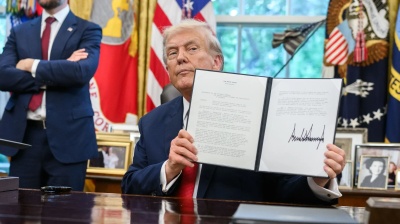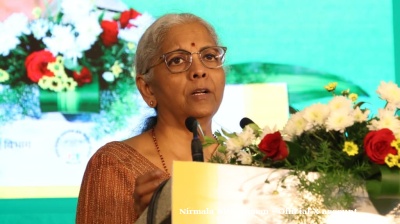Russia is to build up to six “mini” nuclear reactors in Uzbekistan, it was announced during a May 26-27 visit to Uzbekistan paid by Russian leader Vladimir Putin.
The 55-megawatt RITM-200N reactors, making up a power production complex in the central-eastern region of Jizzakh of up to 330 MW, could turn out to be Central Asia’s first nuclear power facility if delivered relatively quickly. Kazakhstan, a uranium producer like Uzbekistan, is working towards building a nuclear plant, though the project is yet to be subjected to a planned referendum, while Kyrgyzstan is exploring some nuclear power options.
Russia through state corporation Rosatom and subsidiary Atomstroyexport—which signed the Uzbek nuclear power plant (NPP) deal along with Uzbekistan's Directorate for NPP and said construction work would commence in the summer—is working to dominate nuclear power development in the region, as well as in countries including Turkey, but it faces competition from rivals including France, China, the US and South Korea.
The “mini nukes” that Uzbekistan has signed up for are actually modest compared to the 2.4-gigawatt nuclear power plant project Moscow has been attempting to finalise with Tashkent since soft investment commitments were inked in 2018.
"Nearly all the leading countries of the world ensure their energy security and sustainable development with the help of nuclear energy," Uzbekistan’s President Shavkat Mirziyoyev said after the smaller nuclear project was announced during the Putin visit.

The Akademik Lomonosov, Russia’s first floating nuclear power plant (Credit: Elena Dider, cc-by-sa 4.0).
One doubt is whether or not Rosatom can yet demonstrate the requisite proven small-reactor nuclear technology, given its background in building large facilities. However, its track record includes the Akademik Lomonosov, Russia’s first floating NPP, docked in the Arctic port town of Pevek.
Putin on his visit was also busy attempting to sell more gas and oil supplies to Uzbekistan.
"[Gas] exports are running well ahead of schedule and we are ready to increase their volume if needed," Putin said.
Mirziyoyev was receptive.
Uzbekistan has annual gas production of around 50bn cubic metres (bcm) a year, but it is not enough to meet domestic demand, particularly during the winter. Russian supplies can help it avoid slipping into an energy shortage crisis. In March of this year, Uzbekistan agreed to start importing up to 11 bcm of Russian gas annually by 2026.
Russia, ever keen to export more gas to Asia given the loss of its number one market, that of the EU member states, as a consequence of its full-scale Ukraine invasion, is also relying on Uzbekistan and Kazakhstan to grant it more capacity on the Central Asia-China (CAC) pipeline that will allow it to transit more gas to China. The problem with that is that the expanded capacity granted to the Kremlin might come at the cost of Turkmen gas export development plans.
There are three CAC Turkmenistan-to-China pipelines that traverse Uzbek and Kazakh territory, with both Kazakhstan and Uzbekistan allocated 10 bcm of capacity across the pipelines for their own gas exports. As the Uzbeks and Kazakhs now need their domestically-produced gas for their own consumption, the 20 bcm of capacity for China deliveries has become available.
Since the conflict in Ukraine began in earnest more than two years ago, Moscow’s relations with the Central Asian states have become awkward in parts.
Mirziyoyev and other leaders in the region have never spoken in support of Russia’s actions in Ukraine. At the same time, all the countries in the region are working with the West on projects including “Middle Corridor” cargo routes designed to facilitate trade transit that bypasses Russia.
Nevertheless, Russia remains hugely important to Uzbekistan economically in terms of the remittances Uzbek migrant workers in Russia send home.
During the visit there was no sign of either side dropping the niceties you might expect from strategic partners.
The Uzbek president described Putin's visit as "historic".
"It heralds the beginning of a new age in the comprehensive strategic partnership and alliance relations between our countries," Mirziyoyev said, as reported by Reuters.
For his part, Putin described Tashkent as Moscow's "strategic partner and reliable ally".
Other announcements made during the visit included Putin’s unveiling of a $400mn commitment to a $500mn joint investment fund set up to finance projects in Uzbekistan.
The two leaders also recapped on how their governments were proceeding with large projects in mining, metals and chemicals. Bilateral projects across investment are by now valued at $45bn.
Uzbek-Russian trade turnover last year amounted to $9.8bn, almost 30% lower than the Uzbek-Chinese total of $13.7bn, with China now established as Uzbekistan’s number one trade partner. Uzbekistan and Russia during the Putin visit talked of ramping it up to an annual $30bn.
Further announcements included one on securing more cooperation between regions. The first meeting of the Council of Regions of Uzbekistan and Russia has been scheduled.
Officials also referred to agreements struck on educational partnerships and the establishment of branches of Russian universities in Uzbekistan.
News

Trump authorises CIA covert operations in Venezuela to topple Maduro
The White House has acknowledged granting the Central Intelligence Agency sweeping powers to conduct covert operations aimed at unseating President Nicolás Maduro, the NYT reported.

India’s finance minister to miss upcoming IMF and World Bank meetings
India’s Finance Minister Nirmala Sitharaman will not attend this week’s annual meetings of the International Monetary Fund and World Bank in Washington, as trade negotiations between New Delhi and Washington remain unresolved.

Young Ukrainians asylum seekers fleeing the war for Germany surges
The number of young Ukrainian fleeing the war and seeking asylum in Germany has surged, following Ukraine’s decision to partially lift its travel ban for men aged 18 to 22, according to figures from the German Interior Ministry.

US may double support for Argentina to $40bn conditional on policy reforms
Washington buys Argentine pesos and mulls creating a new private sector-led $20bn debt facility, which would bring total support to $40bn with the existing swap line, Treasury Secretary Bessent said.



